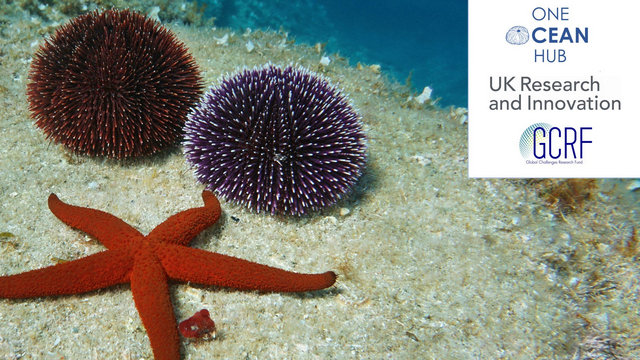
Rhodes University is pleased to announce its role as key partner in a major global research programme to influence ocean health and integrated ocean governance for equitable and inclusive sustainability.
South Africa is a country deeply connected to the ocean which surrounds it. Our oceans regulate temperatures, influence climate conditions, affecting economic activities, livelihoods and sustainability.
From plastic pollution to rising sea levels and acidification to over-fishing, the threats facing our oceans and coastal communities are well-known.
The £20 million ONE OCEAN HUB is one of twelve innovation hub programmes approved by the UK Research Innovation’s Global Challenges Research Fund, to respond to seemingly intractable global challenges through coordinated and transformative research approaches.
The ONE OCEAN HUB will involve more than 50 partners, including world-leading research centres, development organisations, community representatives, governments and multiple UN agencies. Rhodes University plays a key role in the ONE OCEAN HUB as part of this international consortium of research, policy and practice partners.
The aim of the ONE OCEAN HUB is to predict, harness and share equitably environmental, socioeconomic and cultural benefits from ocean conservation and sustainable use. It is an ambitious programme linking natural and social sciences, communities and ecosystems via inter- and transdisciplinary approaches.
Dr Dylan McGarry, Research Associate and Senior Researcher associated with the SARChI Chair in Global Change and Social Learning Systems in the Environmental Learning Research Centre will be a co-director on two of the programme components focussing on integrative and transformative governance of the ocean, developing a challenge fund for emotional connection the ocean through the arts and hub wide (internal and external) social learning and community engagement.
Rhodes University will also directly contribute to the fisheries science and governance components via the leading work of Professor Warren Potts from the Ichthyology Department, and Professor Rosie Dorrington, SARChI Chair in Marine Natural Products.
The programme in South Africa will extend already strong links in ocean science between Nelson Mandela University, the University of Cape Town, SAIAB, SAEON and other partners. The hub will also connect ocean science and practice communities in South Africa, Namibia, Ghana, Fiji and Solomon Islands with knowledge sharing at regional (South Pacific, Africa and Caribbean) and international levels.
The ONE OCEAN HUB is also a space for other faculties, departments and individuals at Rhodes to participate in this growing community committed to supporting change for global ocean health. “Over time we envisage many other departments and scholars getting involved as the programme expands”, says McGarry.
International Programme lead, Professor Elisa Morgera, Director of the Strathclyde Centre for Environmental Law & Governance with the Law School, said: “Millions of people all over the world are entirely reliant upon the ocean for food, jobs and transport yet over-exploitation, competing uses, pollution and climate change are pushing ocean ecosystems towards a tipping point”.
The One Ocean Hub will bridge the current disconnects across law, science and policy to empower local communities, woman and youth – who are particularly impacted by decision-making – to co-develop research and solutions.
The aim is to predict, harness and share equitably environmental, socioeconomic and cultural benefits from ocean conservation and sustainable use.
The Hub will also identify hidden trade-offs between more easily monetized fishing or mining activities and less-understood values of the ocean's deep cultural role, function in the carbon cycle, and potential in medical innovation.
Within the initial five years of the programme, the team hopes to advance an integrated and inclusive approach to ocean management at a national level in South Africa, Namibia, Ghana, Fiji and the Solomon Islands that enhances the resilience of marine ecosystems and of vulnerable groups.
“We are very excited to be part of this multi-scalar inter-disciplinary project” says McGarry. He recognises that this programme builds on and contributes further to Rhodes University’s long history of responding to complex challenges of ocean health and ecosystems, since the early days of the discovery of the Coelacanth and establishment of the J.L.B. Smith Institute of Ichthyology.
“McGarry’s doctoral and post-doctoral research has produced methodologies and approaches to transformative learning, co-engaged research, activism and social change that attracted the attention of the international partners” says Distinguished Professor Lotz-Sisitka, SARChI Chair of Global Change and Social Learning Systems. This has led to his appointment as co-lead on two of the five programme components.
A talented Rhodes University B.Sc and Environmental Science M.Sc graduate who concluded a PhD in the Environmental Learning Research Centre (ELRC) at Rhodes University in 2014, and a post-doctoral placement in the SARChI Chair’s International Social Science Transformations to Sustainability T-Learning research programme in 2018, McGarry’s recent work on empathy, creative practice, social learning and transdisciplinary engagement in policy, justice, environmental science and earth jurisprudence provides a strong foundation for co-leading this inter-disciplinary global programme.
Professor Morgera from Strathclyde University says: “Our aspiration is that decisions on the ocean will be informed by multiple values and knowledge systems and that the rights and worldviews of communities, women and youth will be recognised, valued and realised.”
Professor Andrew Thompson, UKRI Champion for International and Executive Chair of the Arts and Humanities Research Council (AHRC), said: “The sheer scale and ambition of these Hubs is what makes them so exciting. They enable us to deliver a coordinated global response with UK researchers working in partnership with researchers, governments, NGOs, community groups and international agencies across developing countries.
“Each Hub has the potential to transform the quality of life for multitudes throughout the world and safeguard our planet for future generations.”
The Global Challenges Research Fund (GCRF) is a £1.5 billion fund announced by the UK Government in late 2015 to support cutting-edge research that addresses the challenges faced by developing countries. The One Ocean Hub will contribute to the Sustainable Development Goals, in particular SDG 14 on the conservation and sustainable use of the oceans.
